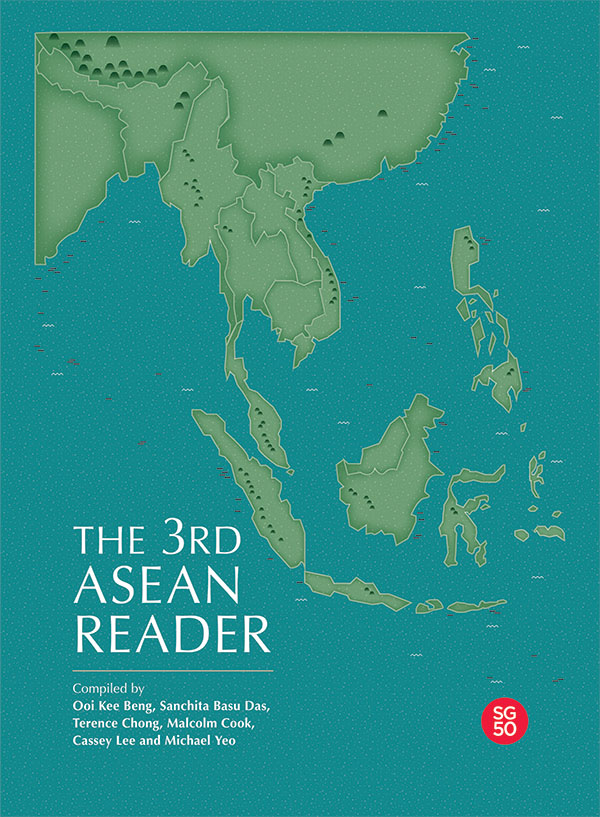Book contents
- Frontmatter
- Contents
- Preface
- Forewords to the First and Second ASEAN Reader: ASEAN: Conception and Evolution
- Forewords to the First and Second ASEAN Reader: ASEAN: The Way Ahead
- Forewords to the First and Second ASEAN Reader: New Challenges for ASEAN
- SECTION I ASEAN: THE LONG VIEW
- Section Introduction by
- 1 Southeast Asia and Foreign Empires
- 2 The Evolving Nature of ASEAN's Economic Cooperation: Original Vision and Current Practice
- 3 The Evolving Nature of ASEAN's Economic Cooperation: Original Vision and Current Practice
- 4 From Political/Security Concerns to Regional Economic Integration
- SECTION II COUNTRY ANALYSES
- SECTION III COMPARATIVE ANALYSES OF THE REGION
- Southeast Asian Societies
- The Southeast Asian Economy
- Southeast Asian Politics
- SECTION IV INTERNATIONAL DEVELOPMENTS
- SECTION V INSTITUTIONS OF ASEAN
- SECTION VI ASSESSING ASEAN'S INTERNAL POLICIES
- ASEAN Political Security Community
- ASEAN Economic Community
- ASEAN Socio-Cultural Community
- SECTION VII ASSESSING ASEAN'S EXTERNAL INITIATIVES
- ASEAN Processes
- ASEAN's Major Power Relations
- SECTION VIII SOUTHEAST ASIA: PERIPHERAL NO MORE
- Bibliography
- The Contributors
- The Compilers
3 - The Evolving Nature of ASEAN's Economic Cooperation: Original Vision and Current Practice
from SECTION I - ASEAN: THE LONG VIEW
Published online by Cambridge University Press: 22 June 2017
- Frontmatter
- Contents
- Preface
- Forewords to the First and Second ASEAN Reader: ASEAN: Conception and Evolution
- Forewords to the First and Second ASEAN Reader: ASEAN: The Way Ahead
- Forewords to the First and Second ASEAN Reader: New Challenges for ASEAN
- SECTION I ASEAN: THE LONG VIEW
- Section Introduction by
- 1 Southeast Asia and Foreign Empires
- 2 The Evolving Nature of ASEAN's Economic Cooperation: Original Vision and Current Practice
- 3 The Evolving Nature of ASEAN's Economic Cooperation: Original Vision and Current Practice
- 4 From Political/Security Concerns to Regional Economic Integration
- SECTION II COUNTRY ANALYSES
- SECTION III COMPARATIVE ANALYSES OF THE REGION
- Southeast Asian Societies
- The Southeast Asian Economy
- Southeast Asian Politics
- SECTION IV INTERNATIONAL DEVELOPMENTS
- SECTION V INSTITUTIONS OF ASEAN
- SECTION VI ASSESSING ASEAN'S INTERNAL POLICIES
- ASEAN Political Security Community
- ASEAN Economic Community
- ASEAN Socio-Cultural Community
- SECTION VII ASSESSING ASEAN'S EXTERNAL INITIATIVES
- ASEAN Processes
- ASEAN's Major Power Relations
- SECTION VIII SOUTHEAST ASIA: PERIPHERAL NO MORE
- Bibliography
- The Contributors
- The Compilers
Summary
It is my great pleasure to be back at the Institute of Southeast Asian Studies (ISEAS) after many years and to have a chance to speak at the High-Level Conference on the Association of Southeast Asian Nations (ASEAN) today.
It could be said that my ASEAN story has developed over the years for two reasons — interest and opportunity. Out of interest, during my studies in Australia and the United States in the 1960s, I studied and then wrote my dissertation on protectionism. When I came back to Thailand, my home country, and started working, I was determined to fight against protectionism, which was basically the industrial policies of that time.
Recalling the early 1970s, when countries in the region like Singapore and Malaysia started opening up their economies, I had opportunities to work with the National Economic and Social Development Board of Thailand. My work was on industrial and trade policies. At the same time, I was doing research on regional cooperation — on ASEAN, in particular. I knew at the time that economies of scale, not protectionism, would help a country to industrialize. So ASEAN economic cooperation would definitely enhance Thailand's industrialization process. We had, at that time, the Kansu Report on ASEAN economic cooperation, which supported this concept.
And when ASEAN held its first summit in Bali in 1976, the agenda on economic cooperation, to which I had made some contribution was very much derived from the Kansu Report's recommendations. The Report's recommendations were also the origin of the agreements on the ASEAN Preferential Trading Arrangements (PTA) and ASEAN Industrial Projects (AIP).
Before economic cooperation was brought to discussion seriously in 1976–77, political and security issues featured much more dominantly on ASEAN's agenda. The economic issue was brought up at the first summit, and became ASEAN's major concern during and after the second oil crisis in 1979.
The oil crisis was a wake-up call for ASEAN countries to accelerate the process of industrialization by means of export pro-motion. There was then a consensus among ASEAN policymakers about having a serious look at ASEAN economic cooperation. For this purpose, a high level Task Force was appointed in 1985, consisting of three members from each of ASEAN's five founding members — Indonesia, Malaysia, the Philippines, Singapore and Thailand. I was a member of Thailand's team.
- Type
- Chapter
- Information
- The 3rd ASEAN Reader , pp. 14 - 16Publisher: ISEAS–Yusof Ishak InstitutePrint publication year: 2015



